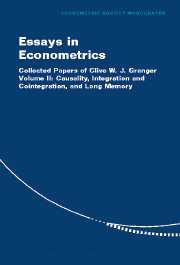Book contents
- Frontmatter
- Contents
- Acknowledgments
- List of Contributors
- Introduction
- PART ONE CAUSALITY
- PART TWO INTEGRATION AND COINTEGRATION
- PART THREE LONG MEMORY
- 17 An Introduction to Long-Memory Time Series Models and Fractional Differencing
- 18 Long Memory Relationships and the Aggregation of Dynamic Models
- 19 A Long Memory Property of Stock Market Returns and a New Model
- Index
18 - Long Memory Relationships and the Aggregation of Dynamic Models
Published online by Cambridge University Press: 06 July 2010
- Frontmatter
- Contents
- Acknowledgments
- List of Contributors
- Introduction
- PART ONE CAUSALITY
- PART TWO INTEGRATION AND COINTEGRATION
- PART THREE LONG MEMORY
- 17 An Introduction to Long-Memory Time Series Models and Fractional Differencing
- 18 Long Memory Relationships and the Aggregation of Dynamic Models
- 19 A Long Memory Property of Stock Market Returns and a New Model
- Index
Summary
By aggregating simple, possibly dependent, dynamic micro-relationships, it is shown that the aggregate series may have univariate long-memory models and obey integrated, or infinite length transfer function relationships. A long-memory time series model is one having spectrum or order ω−2d for small frequencies ω, d > 0. These models have infinite variance for d ≧ ½ but finite variance for d > ½. For d = 1 the series that need to be differenced to achieve stationarity occur, but this case is not found to occur from aggregation. It is suggested that if series obeying such models occur in practice, from aggregation, then present techniques being used for analysis are not appropriate.
INTRODUCTION
In this paper it is shown that aggregation of dynamic equations, that is equations involving lagged dependent variables, can lead to a class of model that has fundamentally different properties to those in current use in econometrics. If these models are found to arise in practice, then they should prove useful in improving long-run forecasts in economics and also in finding stronger distributed lag relationships between economic variables.
The following definitions are required for later sections:
Suppose that xt is a zero-mean time series generated from a zero-mean, variance σ2 white noise series εt by use of the linear filter a(B), where B is the backward operator, so that
and that a(B) may be written
where a′(z) has no poles or roots at z = 0.
- Type
- Chapter
- Information
- Essays in EconometricsCollected Papers of Clive W. J. Granger, pp. 338 - 348Publisher: Cambridge University PressPrint publication year: 2001

